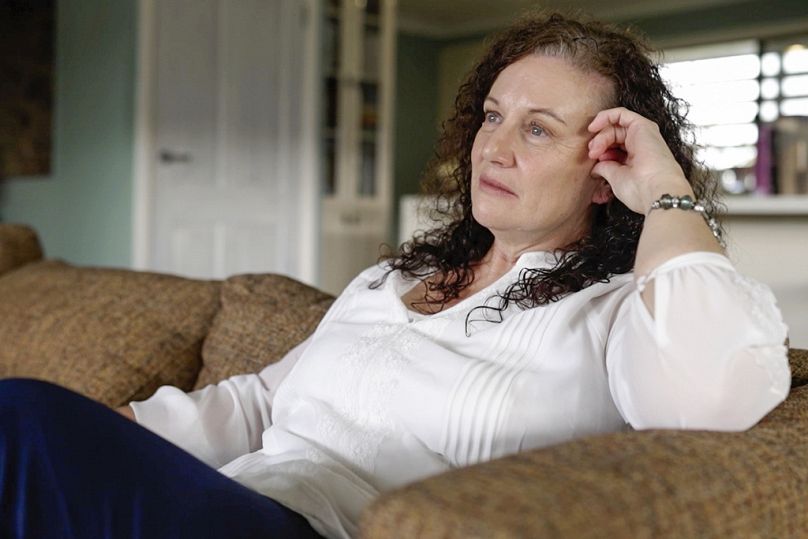Kathleen Folbigg and her legal team are now seeking 'substantial' compensation from the state government for the years she has spent in prison.
Twenty years after a jury found Kathleen Folbigg guilty of murdering her four children, an Australian appeals court has decided to acquit her and overturn her conviction.
 ADVERTISEMENT
ADVERTISEMENT
 ADVERTISEMENT
ADVERTISEMENT
Folbigg, now 55, was already pardoned by the New South Wales state government and released from prison in June after a Spanish scientist proved that her four children may have died of natural causes, as she had insisted.
She was dubbed "Australia's worst serial killer" after she was convicted in 2003 of murdering three of her children and manslaughter in the death of the fourth.
Prosecutors said her children, aged between nine weeks and three years, had been suffocated by Folbigg, who has always denied the allegations, claiming each death was due to natural causes.
On Thursday, the courtroom erupted in applause and Folbigg burst into tears when she heard the words she had been waiting for from Chief Justice Andrew Bell.
"While the verdicts at trial were reasonably open on the evidence available, there is now reasonable doubt as to Ms Folbigg's guilt," Bell said.
"It is appropriate that Ms Folbigg's convictions be quashed,” he added.
Outside court, Folbigg thanked her supporters, lawyers and scientists for clearing her name, including Spanish scientist Carola García Vinuesa who led the investigation.
"For almost a quarter of a century I have faced disbelief and hostility. I have suffered abuse in all its forms. I hoped and prayed that one day I would be able to stand here with my name cleared," said Folbigg.
"I am grateful that modern science and genetics have given me answers to how my children died," she said, tearing up.
How did a Spanish scientist have a hand in the case?
The first to die was Folbigg's son Caleb, 19 days old. One night, she woke up because she had to go to the bathroom. She checked on her baby and realised he wasn't breathing.
She then lost Patrick when the baby was just eight months old. Ten-month-old Sarah and 18-month-old Laura died later. Two of the children had died of Sudden Infant Death Syndrome.
Folbigg always maintained her innocence, but no one believed her story until a Spanish scientist decided to help her.
"The theory that she had killed her children had no evidence. The only evidence was circumstantial, because she was the one finding them dead," Vinuesa told Euronews.
"Folbigg is very grateful, not only to us - the scientists - but also to her lawyers, who have done most of the work for free," she added.
After seeing the case on television and knowing that up to 35% of sudden deaths can be explained by genetic factors, Vinuesa called her colleague, geneticist Todor Arsov.
They decided to compile a list of genes that could cause sudden death. The next step in their scientific investigation was to visit Folbigg in prison and sequence her genome.
"We discovered that there was a mutation in a gene that codes for calmodulin, and this is one of the best known causes of sudden death in infancy," Vinuesa told Euronews.
Vinuesa's team found a gene mutation in two of Folbigg's daughters, while the other two children had severe epilepsy and breathing difficulties.
Experts testified that myocarditis, an inflammation of the heart, was also a possible cause of Laura's death, and that Patrick's sudden death may have been caused by an underlying neurogenetic disorder.
The inquiry, which recommended Folbigg's pardon and acquittal, was prompted by a petition signed in 2021 by 90 scientists, among them were two Nobel laureates, medical practitioners and related professionals who argued that this new evidence should be taken into account.
When asked about the result, Vinuesa is finally satisfied, but looks back with a bittersweet feeling.
"Scientifically, it was a challenge. It was a very hard, intense and sometimes painful process," she told Euronews.
While Folbigg breathes a sigh of relief, her former husband, Craig Folbigg, the father of her four children, whose suspicions sparked the police investigation, called for a retrial.
"That would be the fairest thing to do. To put all this so-called new evidence before a jury and let a jury decide her guilt," said Craig Folbigg's lawyer, Danny Eid.
On the other hand, Kathleen Folbigg's lawyer, Rhanee Rego, said her legal team would now seek 'substantial' compensation from the state government for the years spent in prison.











